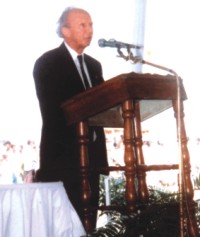|
Tribute
Sir John Wilson
A Humanist and Visionary
Monsur Ahmed Choudhuri
 Everyone dreams, it is a part of human nature. But there are a few individuals who can make dreams come true. Late Sir John Wilson, CBE, DCL was certainly a visionary and played a leading role in promoting services and rights to people with disabilities and for the prevention of avoidable disability throughout the world. On his 88th birth anniversary he is remembered for his firm determination and realistic approach to turn the life of millions of blind people of the Common Wealth countries in particular and disabled persons around the world. Everyone dreams, it is a part of human nature. But there are a few individuals who can make dreams come true. Late Sir John Wilson, CBE, DCL was certainly a visionary and played a leading role in promoting services and rights to people with disabilities and for the prevention of avoidable disability throughout the world. On his 88th birth anniversary he is remembered for his firm determination and realistic approach to turn the life of millions of blind people of the Common Wealth countries in particular and disabled persons around the world.
Educated as a lawyer and by profession an International Aid Administrator, he was a social worker, and remarkable humanist. Born on January 20, 1919 in Nottingham England, John Wilson, at age 12, was blinded in an accident while at school. Even with such odds against him, he studied in Braille at Oxford University where (1937-41) he obtained a degree in Law and Sociology at St Catherine's College where he was subsequently elected as Honorary Fellow. During the Second World War, he became the Assistant Secretary to the Royal National Institute for the Blind. He later became the founder President of the National Federation of the Blind in UK (1952-56).
He was the founder Director of the Royal Commonwealth Society for the Blind (which is now known as Sight Savers International) from 1950 to 1983 and after retirement, he became its vice-president. During this period he and his wife Lady Jean Wilson OBE, also actively involved in humanitarian work, travelled extensively in Africa, Asia, Europe and North and South America. They formed organisations for the blind in some thirty Commonwealth countries and played pioneering activities for the prevention of blindness and education and rehabilitation for the visually impaired persons, such as the Onchocerasis Control Programme in West Africa and projects through which several hundreds of thousand cataract operations were performed annually in developing countries.
He became President of International Agency for the Prevention of Blindness at the founding General Assembly in Oxford in 1978.
His strategy for the prevention of disability which he presented to the UN General Assembly in 1981, the International Year of Disabled persons, led to the establishment of the International Initiative Against Avoidable Disablement later known as the Global Impact Programme which was possible through the combined action by UNDP, WHO and UNICEF. He became the Senior Consultant of this project and became the President of the UK Impact Foundation from 1985-1998.
During his long career of 52 years of social services he received innumerable awards such as the Order of the British Empire (OBE) in 1955, Commander of the British Empire CBE, in 1964, Helen Keller International Award in 1970, World Humanity Award in 1980, John Hopkins School of Public Health and Hygiene, Deans Medal in 1987 and many more. He was knighted in 1975.
Sir John visited Bangladesh on five occasions. He was the dreamer and architect for conceptualising the Floating Boat Hospital "Jibon Tari" commissioned by Impact Foundation Bangladesh.
In 1978 Sir John Wilson came to Bangladesh and travelled around the riverine areas and was appalled by the number of disabled persons in the country. He thought about a boat with a jet engine to take them to the hospital but later he realised that this would not work so he decided that a hospital boat was needed that would actually go to the people of the village. Studies have revealed that about 5.4 percent of people are severely disabled in the target areas, and about 13 percent with moderate disability -- half of which is preventable.
In April 1999, the dream of Sir John Wilson for prevention and correction of disability became true. The Impact "Jibon Tari" Floating Hospital had started its journey with the aim of providing treatment to the disabled and preventing permanent disability in people who lived in the riverine areas of Bangladesh.
In person Sir John was a vibrant, energetic man whose blue eyes looked straight at you making you forget that they did not see in the literal sense. Lady Jean Wilson OBE apart from being a constant companion and guide, was also a strong partner in his work.
When asked about the greatest challenge in his work he replied that convincing governments and leaders that disability is a big issue as 10 percent of the world's population, or one in six people, have disability.
As a mark of respect to his noble work in this part of the world, an English medium school named after him. Sir John Wilson School is established by Social Services and Management Trust in Gulshan in 1995. He visited this school twice in 1996 and 1999. Now the school is grown large with approximately 700 pupils.
Sir John Wilson passed away in his residence at Brighton, Cliff in East Sussex, England on 24th November 1999 leaving behind his widow Lady Jean Wilson. OBE, two daughters Claire E Hicks (Chief Executive, UK Impact Foundation), Jane Martin (School Teacher), hundred of thousands of admirers and people who have benefited from his extraordinary vision.
The writer is Trustee and Director, Impact Foundation, Bangladesh
Copyright
(R) thedailystar.net 2007 |
